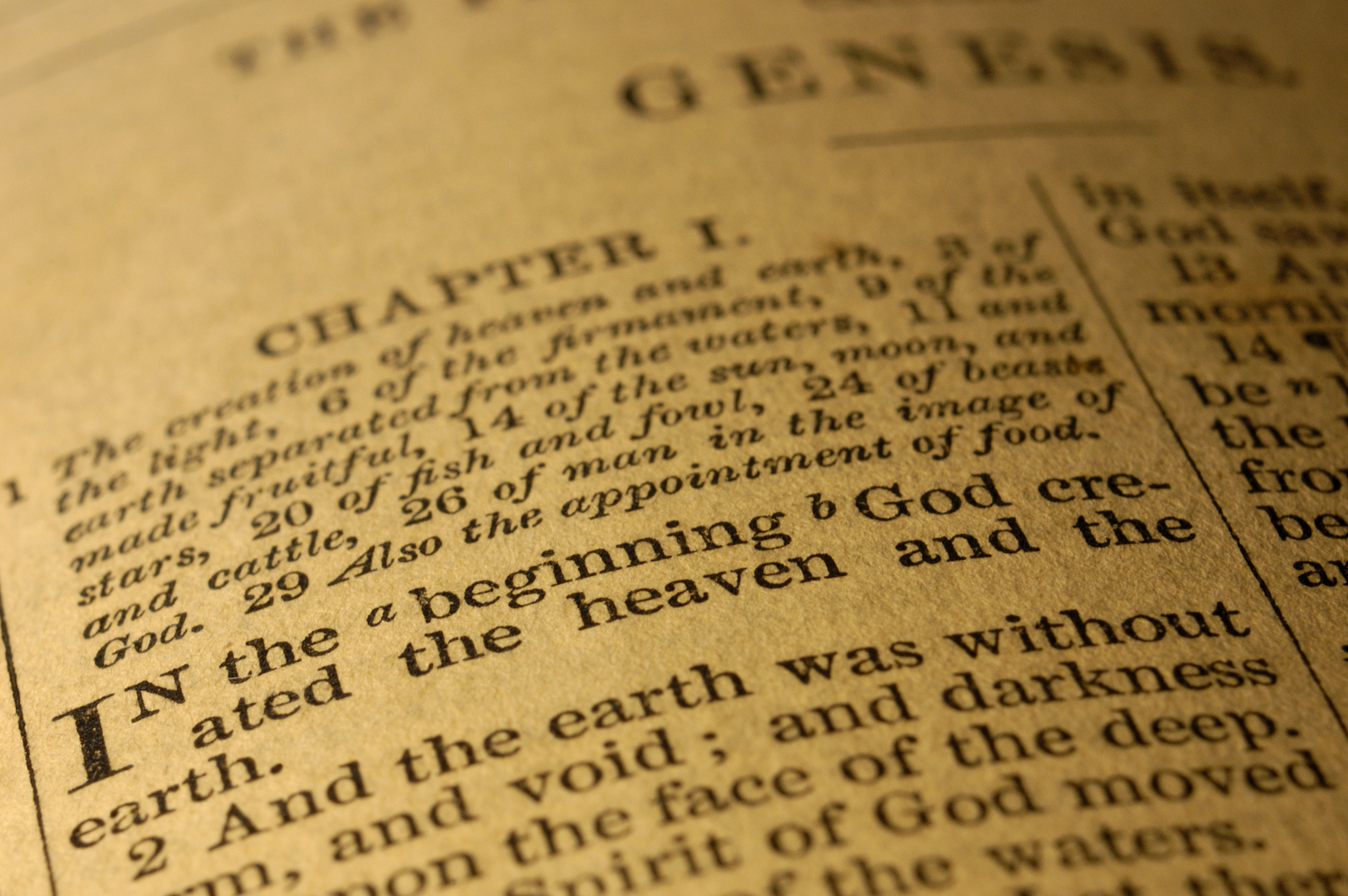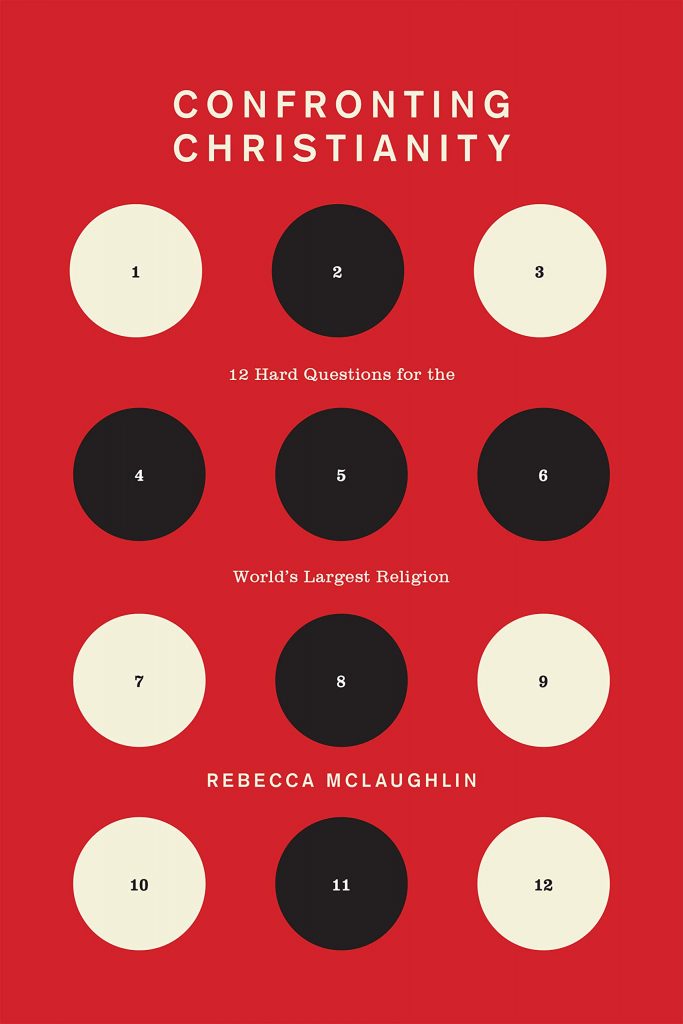
by Ryan Smith | Nov 28, 2019
“In the beginning, God created the heavens
and the earth” (Gen. 1:1).
The Bible opens
with a burst. In 10 short words, the Scriptures introduce us to a cornucopia of
truths that are instrumental to understanding ourselves, our world and our God.
The inaugural
words of God’s Word swirl with life, sound and truth.
First, we see the
sovereign instigator of all things is God. He is the first. Before all things
were, He was.
Second, we see
God is active. He does not sit idly. God creates. He purposes, designs, forms
and decrees.
Third, we observe
that God created everything. God created the earth and all it contains. God
created the heavens and all they contain. As John says of Jesus in the opening
words of his Gospel, “All things were
made through him, and without him was not any thing made that was made”
(John 1:3).
The writer of
Genesis wants readers to know God is King. There is none beside Him. God alone.
What follows are 66
books full of color. These pages flow like an intricately orchestrated
symphony. One finds loud, brash crashes as well as the soft whispers of ethereal
strings. Throughout the sonnet, a single melody weaves its way—dancing as
though entirely central, yet found as clearly at the periphery as the middle.
This melody, we learn, is the Word that would be made flesh—God the Son, Jesus
the Messiah.
Some 31,000
verses after the opening words of Genesis, the Bible reaches a final lyric. The
Bible’s benediction is as concise, yet powerful as its invocation:
“The grace of the Lord Jesus be with all. Amen”
(Rev. 22:21).
What began as an
explosion of sound, birth, joy and light ends on a suspended decrescendo. Yet,
just as the dust settled from the opening rupture, we find foundational truths in
the fade.
The difference
between the beginning and the end of the Bible is not in God—He remains the
same. We know God in His power, uniqueness and glory from Genesis 1, but
consider what the closing verse tells us about this God.
Somewhere between
the beginning and the end of the Bible, this God has disclosed Himself in a
personal way. He is Jesus. He is gracious, and that grace does not stand at
arm’s length from us—waiting for our merit. The grace of God is with us.
God with us. That
is the theme whispering itself through every melodic turn and struck chord of
the Bible’s symphonic exploration. From the angels’ climactic burst of song as
Jesus arrives, through the screeching of the cross, and the crescendo of the
resurrection, the Bible tells us not what has changed, but what has transpired.
In the beginning, God. But by the end of the Bible we learn—God with us.
Advent is a
season of hope. It’s a season of waiting. Just as boys and girls go to bed on
Christmas Eve anticipating the fulfillment of their expressed hopes and dreams,
so too Advent anticipates an arrival of a far-eclipsing magnitude.
Advent holds the
truth of Genesis 1:1 that God is and
holds it up in the hope of God with us.
The end of the
Bible tells us plainly that all of our wildest hopes are true in Christ.
The grace of the
Lord Jesus is with us all. Amen.

by Ryan Smith | Nov 6, 2019
It has been
almost two weeks since rap artist Kanye West dropped his much-anticipated
album, “Jesus Is King.” The angst surrounding this release was virtually
unprecedented. Kanye is one of rap’s premier figures. As evidenced by his eight
previous number-one albums, the appetite for his music is rabid. West is also a
global figure in fashion, architecture, business and a variety of other
exploits. When Kanye speaks, for better or worse, people listen.
“Jesus Is King,”
however, was not reported to be simply another Kanye West album. The newly
professing Christian told fans that this was his first gospel album. A
Christian Kanye album sounded something like a new Little Debbie tuna-flavored
snack cake. Those things don’t go together.
However, despite
the anxiety in both Christian and rap communities, West remained undeterred.
Not only did his lifestyle take a 180-degree turn, his Sunday Services were
drawing thousands not only to hear music, but theologically-rich gospel music.
Not only were people hearing a sermon, but a doctrinally-sound call to
repentance from sin in light of a holy God.
Kanye was not
just sharing gospel music; he was sharing the Gospel.
But could Kanye West
actually understand and represent Jesus Christ? Would Christianity water-down
West’s edge and creativity?
“Jesus Is King”
is not your normal record. Foregoing traditional intros, outros and song
structures, the album jumps from track to track like interrupted thoughts. In a
way, the album gives us a look into West’s mind and personality. Amazingly, it
also gives us quite a glimpse into the restless soul of a new believer.
The album opens
with the gospel-choir anthem, “Every Hour.” It’s what one might associate with
a large choir on a gospel album. Yet as the organ begins to swirl on the second
track, “Selah,” the listener gets the first words from Kanye himself. What the
listener finds is not only a bold declaration of faith in Jesus Christ set to brooding
orchestration and pounding drums, but lyrics that stream like the first cries
of a new-born. Viscerally-pronounced Scripture references adorn the track as
Kanye exclaims:
John 8:36
To whom the Son set free
Is free indeed
He saved a wretch like me!
The album’s third
track, “Follow God,” openly displays Kanye’s struggles in walking the path of
righteousness with feet that are used to a much different soil. He admittedly struggles
with temper, entitlement and being called out when he is not acting Christ-like.
The frustration and desire are evident.
The next track,
“Closed on Sunday” has been featured on multiple media outlets and is likely
the best (if not the only) song you’ve ever heard on Sabbath rest. For a man
with such a rapid lifestyle, hearing him talk about laying worldly trappings
down and taking up hands to protect his family with prayer and careful doctrine
is not only refreshing, it’s challenging. He writes,
Stand up for my home
Even if I take this walk alone
I bow down to the King upon the throne
My life is His, I’m no longer my own
The album is full
of calloused Christian truisms inbreathed with new life by one now
understanding their significance. Not only are there solid Biblical truths and
moments of amazing discernment on the album, but there are also moments of
immaturity. However, these moments add to the genuineness of “Jesus Is King”
and remind the listener that Kanye is a work in process—as we all are.
Kanye covers an
array of topics at the forefront of any believer’s mind. He addresses purity
(“Water”), stewardship (“On God”), contentment (“Everything We Need”) and his
broken past (“Use This Gospel”).
As he has always
done, on “Jesus Is King” Kanye asks his questions out loud and makes his
statements with brash exclamation points. He is aware that his conversion is an
unlikely story, but as he continually points out, God writes unlikely stories.
Kanye’s past, his success, his future and his concerns are all as he says, “On
God.”
Is “Jesus Is
King” a good album? It depends on your definition of good. Rap critics have
both applauded and panned it. Christian critics have both praised and
disparaged it. Personally, I really enjoy the album. It’s eclectic, full of
catchy hooks, and puts the skills of one of modern music’s most celebrated
artists on display.
Yet none of those
things are what make “Jesus Is King” a good album. What makes this album great
is that it exalts and glorifies Jesus Christ. When I listen to it, I am led to
worship God for His unmerited grace and mercy toward sinners like me. I’m
reminded that the Christian life is hard. I’m reminded that following Jesus
requires conviction, rest, and brilliant shouts of wonder and praise.
Writer Jared
Wilson had the most pointed review of “Jesus Is King” and one we as Christians
should take to heart. He tweeted,
“Kanye’s album sounds like a new Christian
who hasn’t learned yet from the more ‘mature’ that you’re supposed to be more
embarrassed about your faith. It’s not cool. It’s only occasionally clever. But
there’s a purity to it, rough edges and all.”
Whatever one may
say about Kanye after listening to this album, one cannot deny the bold
emphasis of West’s message: Jesus Is King.
It’s easy to be
skeptical of Kanye West. Our shifting society and popcorn culture have left us
jaded and cynical. Kanye is an easy target for our calloused projection. It’s
also easy to get overly excited about the possibilities of having Kanye on the
“Christian Team.” His influence and profile are attractive. But both of these
truths put Kanye in the line of fire. So how should the Christian respond to “Jesus
Is King”?
As Kanye exclaims
in the song “Hands On,”
Yes, I understand your reluctancy
But I have one request you see
Don’t throw me up
Lay your hands on me
Please, pray for me
We should pray
for him. Amen and Amen.

by Ryan Smith | Oct 21, 2019
No one likes to
be criticized.
We spend a great
deal of time and effort covering our faults. We hope the world around us sees
and experiences the best version of ourselves at every turn. We don’t want to make
mistakes.
At the same time,
we know we are broken creatures. For every fault we conceal, another rises to
the surface. We find ourselves exposing the worst versions of ourselves – often
to those we love the most. Our words can hit targets at which we never aimed.
Maybe a tone is perceived wrong. Perhaps we brought up an issue in innocence
that is tender to another. Maybe we forgot.
Despite our best
efforts, we do make mistakes.
We live in a
social economy in which criticism is a currency. Social media allows us to fire
shots across bows we likely would never approach in person. Anonymous jesters
fire criticism and critique without provocation. Beating someone else to the
punch is considered of higher virtue than taking the time to ensure the punch
is well-placed or even necessary.
Not all criticism
is beneficial. Not all critics are right. At the same time, as sinful social
people, we do need correction from others. Warranted or unwarranted, each of us
will face critics and criticism. So how should we handle them?
1. Listen to your critic
If you
immediately shut down a critic, you are assuming you have no blind spots or
areas of improvement. Criticism is not always bad. In fact, many proverbs speak
favorably of criticism from those who care for us. Listening reflectively to
criticism allows an offended party to be heard and offers us the opportunity to
open a door of self-examination, perhaps previously unconsidered. Don’t shut
the door on every critic. There are some you need to invite in.
2. Appreciate your critic
Usually, someone
seeking to bring an issue to our attention does so with a good motive. They may
not handle it well or express it in a way that prevents a sting. Looking beyond
the words of a critic, however, allows us to see the heart behind the
criticism. We want to be and do what is best. A critic likely wants that for us
as well. Seek to appreciate the heart behind someone’s criticism, even if you
don’t appreciate the content.
3. Evaluate the criticism
Even if a critic
does have an uncharitable disposition toward you, they may not be wrong in
their criticism. Recognize that we all have blind spots, and however poorly a
person may have handled a critique, ask yourself and someone else you trust
whether or not there is something valuable in a criticism for you to address.
Don’t throw the baby out with the bathwater. You may dismiss a critic, but
don’t completely discount their perspective.
4. Apply the criticism
Criticisms can
have many applications. They may serve to show us a sin of which we need to
repent. They may help open our eyes to another’s perspective. They may simply
reveal a fault of the critic themselves. Either way, receiving criticism never
ends in merely hearing it. One must ask what there is to gain from receiving criticism.
Some critics just
want to hurt others. They are jerks.
Some critics want
our good, but don’t handle it well. They are trying.
Some critics we
welcome, knowing they have our best at heart and have been given access to our
lives as those with a valuable perspective. They are friends.
Criticism can
sting. Our gut reaction is often to label any critic as a jerk when they may genuinely
be trying to be a friend. Don’t be quick to dismiss criticism. Prayerfully
listen, appreciate, evaluate and apply what others afford us from their
perspective. It just may do us some good.
“Faithful are the wounds of a friend…” –
Proverbs 27:6

by Ryan Smith | Sep 30, 2019
Books on
Christian apologetics aren’t casually considered must-reads.
We associate
apologetics with academia, doctrinal debates and something pastors do in
comment sections of blogs.
But still, we
have questions. Our world has questions. Our neighbors, co-workers, family
members, all have questions about Christianity that often go unasked or
assumed. Somewhere between the church doors on Sunday morning and the quiet
solitude of our inner thoughts before sleep, we often think, “Yeah… but what
about…?”
Is it okay to
confront Christianity?
Questioning the
Christian faith is okay – even for Christians. Throughout the Scriptures, we
find even the most devout followers having questions, confronting issues and
having to wrestle with tough circumstances and differing worldviews. Even more
today, in a growing climate of Christian hostility and moralistic relativism,
one may wonder if one can indeed face the head-wind of questions buffeting
Christianity’s doors and still stand firm.
Whether we think
so or not, we live in a day when Christianity is challenged in both public
discourse and private vitriol. While the questions may echo in the minds of
those struggling with faith both inside and outside the church, all too often
these same questions don’t sound from our lips or resonate from our platforms.
This is why the
book Confronting Christianity by
Rebecca McLaughlin is so timely.
McLaughlin is not
your common stereotype of someone who might offer a book on Christian
apologetics. She’s relatively young. She’s not American. Though married with
children, she openly discusses her lifelong battle with same-sex attraction.
She is friends with and respected by a wide assortment of people—from Ivy League
academia to soup-kitchen homelessness—whom she engages in civil and
contemplative discussion.
McLaughlin isn’t
afraid of tough questions, and she has little interest in providing platitudes.
Confronting Christianity addresses
real issues offered from both inside and outside the church. The book proves
helpful for the committed churchgoer as well as the atheistic antagonist to
Christianity.
In fact, through
McLaughlin’s conversational, humble and vulnerable approach to writing, one
could see the Christian and the atheist both enjoying healthy dialogue together
over marked-up copies of this book and steaming cups of tea (not coffee—she’s
British).
Consider the
twelve questions McLaughlin addresses in Confronting
Christianity:
- Aren’t We Better Off Without Religion?
- Doesn’t Christianity Crush Diversity?
- How Can You Say There’s Only One True Faith?
- Doesn’t Religion Hinder Morality?
- Doesn’t Religion Cause Violence?
- How Can You Take the Bible Literally?
- Hasn’t Science Disproved Christianity?
- Doesn’t Christianity Denigrate Women?
- Isn’t Christianity Homophobic?
- Doesn’t the Bible Condone Slavery?
- How Could a Loving God Allow So Much Suffering?
- How Could a Loving God Send People to Hell?
My guess is
either you or someone you know is asking these questions. Even if you are not,
you may know the right answers but find yourself without compelling arguments
as to why you hold your positions.
McLaughlin is
disarming yet firm in her convictions. She is not afraid to chase steep rabbit
trails or shed light on dark corners of Christianity’s history. In all of her
attempts to answer today’s biggest critiques of Christianity, however, her tone
is respectful, understanding and one that is to be emulated.
Confronting Christianity is the book you
didn’t know you were looking for. Even if you’ve never read a book on
Christianity in your life—much less one on Christian apologetics—you will find
this book captivating. You may find answers to your questions. You may find
even more questions you weren’t even asking. Either way, you will find sound
Biblical truth presented with understanding and compassion.
Don’t be afraid
to confront Christianity. I know you will be helped if you do so with this
book.

by Ryan Smith | Sep 24, 2019
It’s happening.
If you’ve been
following the landscape of television over the past few years, you’ve noticed
the cresting wave of services like Netflix, Hulu and Amazon Prime leaving
traditional cable television powerhouses clamoring in the shadows.
Of course, as the
digital revolution has taken place, it has seen the deconstruction of many
media types (I’ll forever miss you Compact Discs) and has created new
formidable foes for media outlets previously considered to be untouchable
mainstays. It’s showbiz Marxism.
Like any teenager
will tell you, however, the adjustment from sprouting youth to king of the
mountain is an awkward transition and has its unfortunate bumps along the road.
When our consumption habits change, there is often a fair amount of
entertainment indigestion.
Many believed the
most significant adjustment for our society was in cutting the cord and letting
cable fall into the abyss through the echoes of standard definition TV and
headphone jacks. Consumers (as I’m sure they told you…multiple times) gave up
on traditional cable packages and opted for single services like Sling,
YouTubeTV, Hulu, Roku and others to satisfy their immediate viewing desires.
Of course, where
the money flows the company goes. Sensing this lemming stampede, major networks
have begun launching their own places for digital premium content. No longer
can one simply tune in to the game on ESPN. You now need to buy ESPN+. Want to
see the newest NBC show? You’ll have to fork over the cash for Peacock, the NBC Universal streaming
service.
All of this is in
response to companies like Apple and Disney seeking to consolidate content and
place it behind protective barriers from the everyday consumer. It’s an all-out
cash grab, and fortresses are being hastily constructed. Each one is
accessible, of course, for an additional $4.99 per month.
If this sounds
confusing to you, then you are in the right boat. Not only is this a
frustrating time for the average Joe, but it’s a time when more is being asked
from the consumer and less is available for the price.
So what is one to
do in this shifting climate? Quit.
Now may be the
best time for you to quit TV. If that sounds impossible, at least consider this
a time to drastically reduce the hold entertainment has in your life. According
to a recent Neilson report, the average American watches more than 34 hours of
television each week (including movies and other video-related screen time).
That is almost a day and a half per week. What could you do with an additional
day and a half at your disposal?
In a recent
article for lifehack.org, writer
Craig Dewe observes several concerns directly related to time spent in front of
TV shows.
Dewe observes not
only the rampant negativity displayed in everything from reality TV to network
news but notes, “In comedies, we laugh at the stupid/overweight/socially
awkward/racial stereotype/different people. The news is filled with stories of
pain/suffering/disaster/death and arguing. Drama has to be about problems in
order to create the drama. All of this is affecting your outlook on life and
the way you see the world.”
Alongside the
fact that TV creates unrealistic expectations and feelings of inadequacy, Dewe
notes the basic effects of sitting immobile for hours and losing grip on the
battle for self-discipline can harm our bodies physically, our minds
emotionally and our spirits spiritually.
If you have ever
considered pulling back on entertainment programming, there has never been a
better time than now. As the networks are shifting from their global Pangea and
every commercial is a carrot for another $4.99 per month to hand out, consider
sitting this one out.
If you are
someone who benefits from certain TV shows, consider time away as a sabbath or
a summer hiatus. Pull the plug and wait until the hierarchy is re-established
and content can flow to the consumer in ways that benefit not just your mind,
but your wallet as well.
Quit TV and see
what happens. Go outside. See a human. Read a book. Make an informed decision
of your choosing. You may find that real life can offer all the entertainment
you need.
Leave the drama
to the networks.





